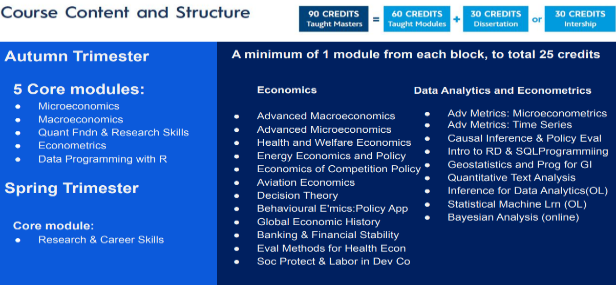MSc Economics and Data Analytics
MSc in Economics and Data Analytics
(One Year Full-Time or Two Years Part-Time)
Applications
for the 2025/26 are accepted on a rolling basis from October 1st and will close on 31st of August 2025.
For information on fees and how to apply, please click here.
The MSc in Economics and Data Analytics is a programme designed for those who
want to gain the in-demand skills needed to succeed in today's job market. This
programme, jointly offered by the UCD School of Economics and the UCD School of
Mathematics and Statistics, combines knowledge of human behaviour and decision-
making from economics with the latest data analytics techniques, such as Data
Programming, Machine Learning, and Bayesian Analysis. Students can choose to
study full-time or part-time and will receive a strong foundation in both economics
and data analytics through core modules. Students will also have the opportunity to
put their skills into practice through talks with industry professionals, group projects,
and presentations. In the spring semester, students will have the choice to select
from a variety of elective modules in data analytics, econometrics, and economics.
Graduates of this programme will be well-prepared for exciting career opportunities
in technology, consulting, NGOs or government, and even doctoral studies in
economics.
It's a great option for anyone interested in understanding how data can be used to understand the economy and drive business decisions. You'll learn from top economists and statisticians, in a blended programme that has both online and in-person modules in small class sizes, and get hands-on experience through workshops and projects. Plus, you'll have opportunities to connect with industry professionals and be a part of the school community through research seminars and more. The programme will help prepare you for a variety of exciting career paths, including graduate studies.

Economics and Data Analytics Video Gallery
Programme Content and Structure
| 90 credits taught masters | 60 credits taught modules | 30 credits dissertation or internship |
Teaching on this programme follows a blended approach. All modules in economics and
econometrics will be taught in person; all modules in statistics and data analytics will be taught
online.
econometrics will be taught in person; all modules in statistics and data analytics will be taught
online.

Career Opportunities
This programme prepares graduates for a wide range of highly in-demand career paths. Data analytics is at the forefront of the modern economy, and by completing the MSc in Economics and Data Analytics, you'll be equipped with the skills and knowledge to succeed in the competitive job market of today and tomorrow. Graduates from related programmes, such as the MSc in Economics and the MSc in Data Analytics, have gone on to successful careers in industries like tech, finance, and consulting. Others have landed positions at public institutions like central banks, ministries, and research institutes, or continued their studies with PhD programs in economics or statistics.
Entry Requirements
- A primary degree with at least an upper second class honours or international equivalent in Economics or in a degree in which Economics is a major component
OR
- A minimum of upper second class honours degree in a cognate area with a strong quantitative component (e.g. business, finance, engineering, ...).
OR
- An upper second class honours in a Higher Diploma in Economics or in the MSc Qualifier
Dr Benjamin Elsner, UCD School of Economics
" I am very excited about the launch of the MSc in Economics and Data Analytics. For over 15 years, the UCD School of Economics has been running a thriving masters programme. Our graduates receive a rigorous training in economic theory and quantitative analysis, which lays the foundation for many successful career paths. The new MSc in Economics and Data Analytics, jointly offered with the UCD School of Mathematics and Statistics, builds upon this foundation and offers a highly attractive skill set to its graduates. In today's data-driven world, many careers require a thorough understanding of data analytics combined with the analytical mindset from economic theory. The programme offers exactly this combination and strikes a balance between theory and applications.
Our expert faculty members will provide students with the skills they need to succeed in today's competitive job market, while the location of Dublin as one of the world's major tech hubs means our graduates will have access to a wide range of exciting career opportunities."
Dr Michael Salter-Townshend, UCD School of Mathematics and Statistics
"Since 2015 we have developed a strong and successful postgraduate programme in Data Analytics. We show our students how to use cutting edge methods to perform key data-driven tasks, from processing and visualising data all the way up to fitting and critiquing complex statistical models. But we make sure to build solid foundations on the theory, so that our students can not only use what they learn but also adapt the methods to novel situations.
We've already seen many great students coming from a background or interest in economics, but now I'm really excited to see the combination of Economics with Data Analytics offered for the first time in this new programme. This will allow students who are keen to focus on economics applications to pursue masters level competency in Data Analytics at the same time. They will leave with high level skills in data programming, machine learning, inference, and more (depending on the options they choose) along with experience in applying these methods to economics problems.
Our Data Analytics modules complement the economic theory modules and the combination will create a new breed of expert who is both a proficient coder and data analyst, as well as being savvy in economics. This is sure to be a highly prized skillset. "


